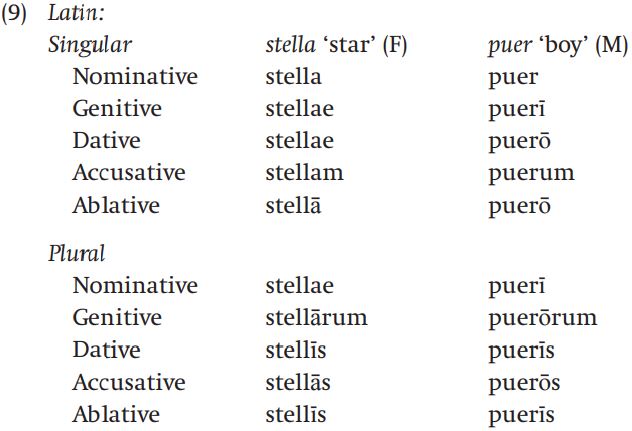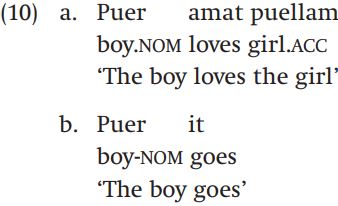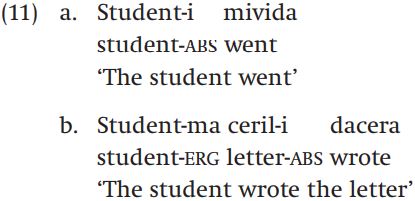


 Grammar
Grammar
 Tenses
Tenses
 Present
Present
 Past
Past
 Future
Future
 Parts Of Speech
Parts Of Speech
 Nouns
Nouns
 Verbs
Verbs
 Adverbs
Adverbs
 Adjectives
Adjectives
 Pronouns
Pronouns
 Pre Position
Pre Position
 Preposition by function
Preposition by function 
 Preposition by construction
Preposition by construction
 Conjunctions
Conjunctions
 Interjections
Interjections
 Grammar Rules
Grammar Rules
 Linguistics
Linguistics
 Semantics
Semantics
 Pragmatics
Pragmatics
 Reading Comprehension
Reading Comprehension|
Read More
Date: 2023-06-06
Date: 2023-10-05
Date: 22-2-2022
|
Case is another grammatical category that may affect nouns (or whole noun phrases). In languages that employ the inflectional category of case, nouns are distinguished on the basis of how they are deployed in sentences, for example, whether they function as subject, direct object, indirect object, as a location, time, or instrument, or as the object of a preposition. In Latin, for example, nouns must be inflected in one of five cases, with singular and plural forms for each case:

The nominative case forms are used for the subject of the sentence. Accusative is generally used for the direct object and dative for the indirect object. Genitive is used for the possessor (for example, the boy’s shirt). Ablative is used for the objects of prepositions (for example, cum ‘with’, dē ‘from’), although some prepositions take objects in the accusative case (ad ‘to’, post ‘after’).
Latin displays what is commonly called a nominative/accusative case system. In this sort of system, subjects of verbs are nominative, whether the verbs are transitive (that is, they take an object) or intransitive (they don’t take an object):

Less frequent is a kind of case marking system called an ergative/absolutive system. In this kind of system, the subject of a transitive verb gets a case called the ergative. The subject of an intransitive verb gets a case called the absolutive, which is also the case used for the direct object of a transitive verb. The examples in (11) from Georgian illustrate an ergativeabsolutive case marking system .

You can see the two systems compared schematically in (12):

Ergative/absolutive case systems are less frequent in the languages of the world than nominative/accusative systems, but they do occur in the PamaNyungan languages of Australia (for example Dyirbal), in the Tsimshianic languages of North America (e.g. Sm’algyax, spoken in British Columbia), in the language isolate Basque, as well as in Caucasian languages like Georgian.
|
|
|
|
دراسة يابانية لتقليل مخاطر أمراض المواليد منخفضي الوزن
|
|
|
|
|
|
|
اكتشاف أكبر مرجان في العالم قبالة سواحل جزر سليمان
|
|
|
|
|
|
|
المجمع العلمي ينظّم ندوة حوارية حول مفهوم العولمة الرقمية في بابل
|
|
|